The installation of the boiler is one of our major winter projects, along with tuning up our various antique tractors and configuring the implements. (Also high on the winter project on the list: having a baby! Caitlin is due in two weeks, so if it gets a bit quiet over here, that'll be why.)
|
Each year since starting the farm, we've invested in some long-term infrastructure and equipment to make it run more smoothly, increase efficiency, and extend or improve the growing season. These have included tractors and implements, greenhouses, cold storage, and most recently, the installation of a pond and irrigation system. For next year, we're putting in a wood-pellet boiler to provide heat to our greenhouses. This will help us start seedlings, get tomatoes going earlier, and reduce the incidence of disease in the tomatoes later in the season (by being able to heat on cold mornings to evaporate moisture that encourages diseases to spread). The pond and the heating system will also increase the farm's resilience in the face of shifting climate and weather patterns.
The installation of the boiler is one of our major winter projects, along with tuning up our various antique tractors and configuring the implements. (Also high on the winter project on the list: having a baby! Caitlin is due in two weeks, so if it gets a bit quiet over here, that'll be why.)
0 Comments
 We're happy to announce that sign-up for our late fall CSA is now open! The fall CSA starts the first week of November and will run through the week before Christmas, for a total of seven weeks of yummy fall and winter veggies for $200. We'll have both storage crops - potatoes, beets, carrots, onions, garlic, a variety of winter squash, parsnips, etc. - and fresh vegetables like Brussels sprouts, spinach, broccoli, braising greens, and more! We're accepting both on-farm and delivery shares, with drop-off locations in Middlebury and Rutland. The share is a medium-to-large size, which we recommend for 2-4 people. However, since many of the vegetables at that time of year are storage crops, the share is also appropriate for individuals or couples who have some storage capacity and would like to have extra for the later months. (Or, of course, for those who eat an above-average amount of veggies.) Check out the CSA page for more info and to sign up -- and as always, get in touch with any questions! Are you dreaming of summer yet? Put a deposit down on this summer's enjoyment by signing up for a CSA now!
We've got a few new developments for the CSA this year, which we're pretty excited about. We're adding some new produce to the mix, including fennel, sweet corn, and strawberries. We've also partnered with several farmer friends to make meat, cheese, bread, eggs, and honey available to our subscribers. (See the CSA page for more details.) For folks who pick up on the farm, we're expanding the "market style" pick-up that we trialled with the Winter CSA into the summer. We got really good feedback about this system, which gives you a bit more variety and control over what you take home each week. We'll have a few tables set up with several types of produce on each, and you'll be able to choose what you want from each table. (Some items, like early tomatoes, will still be distributed more tightly to make sure everyone gets their share.) We're also expanding our workplace delivery program to reach more businesses between Rutland and Vergennes. Those who get deliveries will have traditional set boxes -- but they will get them delivered directly to their place of work! If you think some of your coworkers might be interested in a CSA, let us know! We are happy to talk to HR or office managers about the program and how we can make it work best for your business or organization. If you have any questions, please get in touch. Remember last week, when we said that we'd nearly sold out of winter things? Well, after good sales at last week's holiday market, it's reached the point that it no longer makes sense for us to go the Farmers' Market. We'll be selling winter squash, onions, and carrots wholesale (or to individuals who want to come by the farm), and we've got a strong finish for the last weeks of the Winter CSA, but not enough variety for a market stand.
Though we'd been hoping to stay at the market until the end of December, it will be nice to have two weekend days again for a while. As of now, we're planning to be back when the market starts again in March, with greens; we'll keep you posted as that gets closer. If you'd like to purchase squash, onions, or carrots, just give us a holler! 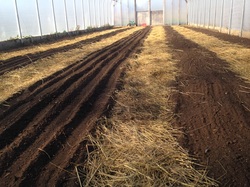 December is here, but we are still farming! We've been seeding greens, carrots, turnips, and radishes, with an eye towards the early spring; the seeds should just sprout in the next weeks, then hold during the dark and cold of deep winter, to start growing again in late February and March. Our winter sales this year were much higher than we'd expected; we've sold out of nearly all our storage crops except onions and winter squash and what we're saving for CSA. We planted twice as many potatoes this year over last, and next year we'll be planting even more. Same with carrots, beets - even our parsnips are nearly sold out! It's a great sign of the maturation of the local foods movement - for farmers and consumers both - that winter demand is growing. No longer must localvores follow the plenty of summer with turnips all winter - though winter's pickings are certainly slimmer than August's, there is a huge increase in variety and quality over what was available several years ago. On our own farm, we were excited to be able to provide food for our neighbors for an additional two months this year with our Winter CSA and at the farmers' market, and hope next year to expand our winter growing even more. A good hard freeze this morning seems like a fitting kickoff to the first week of our first Winter CSA. The CSA will run for seven weeks, with an extra-big share for Thanksgiving and another one at the end as a send-off. We're pretty pleased with the offerings we've got lined up - lettuce, spinach, arugula, kale, beets, carrots, potatoes, sweet potatoes, parsnips, winter squash of several sorts, pea shoots, dry beans, onions, garlic, cauliflower, broccoli, and right now we still have tomatoes and peppers. We're still seeding greens for the late winter, some of which we're planning to have in the very early spring when the winter farmers' market opens up again in March. All in all, we're pretty happy with how the winter growing season is looking.
At home, we've been getting into the winter routines - splitting kindling, simmering soup. This method of "perpetual broth" in the slow cooker has been pretty amazing for us - if you've got vegetables in the house (which we and, we hope, our CSA members, always do) a pot of hot broth means that you're only ever a few minutes away from a satisfying meal. Just chop up some carrots/potatoes/sweet potatoes/beets/broccoli/cauliflower/etc, saute an onion and garlic if you've got time, add the broth and leftover rice or meat or beans or mashed potatoes or squash, whatever is to hand and seems good. We freeze whole tomatoes in the summer, and they're perfect for soup like this. Simmer for a few minutes, throw in a handful of greens at the end, some salt and a dash of lemon juice, and there you go! A cup of broth is also a good holdover when dinner is only half an hour off but kids are hungry now - nourishing without being too filling for too long. We hope that you're easing into the new season with pleasure and look forward to seeing you soon! Huge thanks to all our Summer CSA members! We've had such a good year - we sure hope you've had a good one as well. Folks who are staying on or joining us for the Winter CSA, please note that it starts the first week of November - there is no CSA pick-up next week.
The main growing season is almost over. The final CSA pick-up and the last outdoor market are both next week! This has been a really good season for us, on the whole - plenty of challenges, a few disappointments, but mostly good growth all around. We employed more people, worked more land, grew and sell more food than any previous year. We were excited to expand our CSA to include workplace delivery, and that program seems to have been a success.
We also expanded our understanding of this piece of land - where the wet spots and cold spots are, where the deer and woodchucks live, where the soil is more rocky or more sandy. It's been a season of good learning and good work. The summer may be over, but we're not quitting yet! The Winter CSA starts November 5, the market moves indoors to Mary Hogan School starting on the 2nd, and we've got crops in the ground and in the greenhouse that we intend to keep harvesting through December. (Plus multiple tons of storage vegetables nearly all cleaned, sorted, and stored.) So, thanks to all our amazing customers - CSA members, farmstand regulars, co-op produce buyers - for making this trip with us! We're looking forward to seeing you this week, and next week - and hopefully, well into the winter. (And while we're talking about it, the Winter CSA is filling up fast - let us know soon if you want in!) Fall is the heavy harvest season - all the root vegetables, the winter squash, and the onions get pulled and hauled and crated and hauled some more, in the thousands of pounds each. One of our employees told us a story about how she laughed and laughed when some friends suggested she join them for a morning at the gym the day after the crew brought in more than a ton of onions in one day.
We're still getting all the infrastructure in place - the barn in which the new coolers were meant to go turned out to be in worse shape than we thought once it was all cleared out and needed some shoring up (and a lot of power washing), but now is ready for the cooler to be assembled. Jeremy is putting the finishing touches on a root washer to making the cleaning of all those roots much more efficient. All in all it's a busy time! We've grown dry beans a few times, though never in much quantity, mostly just for our own family. They're a great crop in a number of ways - as a nitrogen-fixing legume they're good for the soil, they don't require a whole lot of work between planting and harvesting, and, once processed, they produce a great and somewhat unusual product that stores well and doesn't take up too much room. The tricky part is that little phrase, "once processed."
The bean plants need to be pulled and the pods dried down thoroughly so that the beans don't rot or sprout. Then the beans themselves need to be separated from their pods (known as threshing), cleaned of dirt and pieces of plant, and checked over for quality. On a household scale, we would just keep a bushel basket of pods handy and shell beans by hand whenever we watched movies or as we were sitting around the kitchen table after dinner. We mostly managed to keep up with our own bean usage that way, but it's not a particularly viable method on a commercial scale. Of course, there are plenty of machines one can buy to thresh and clean beans, but those are also typically not viable on the relatively small commercial scale at which we are operating. There are a number of small-scale solutions, powered by bikes or made from modified wood chippers. There are also extremely low-tech solutions, like putting the beans in an old pillowcase and whacking it against a hard surface until the beans fall out of their shells, and then pouring it all in front of a fan a few times to blow away debris. That will probably be our solution for a few batches of beans until we figure out which kind of slightly higher-tech solution will work best for us. Look for dry beans at the market in a few weeks and in CSA pretty soon! |
Follow us on Facebook for more updates! Archives
March 2016
Categories
All
|

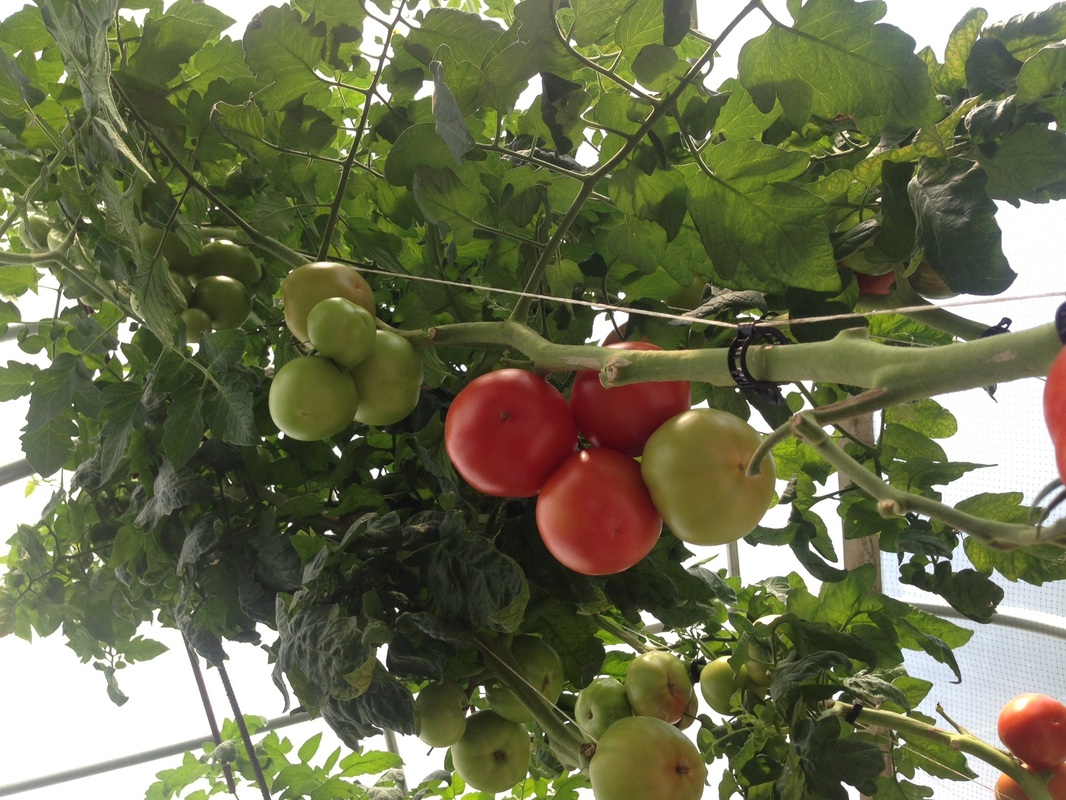

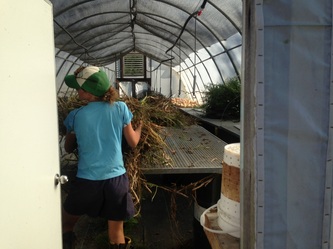
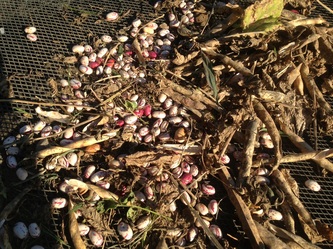
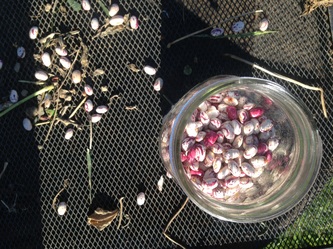

 RSS Feed
RSS Feed
